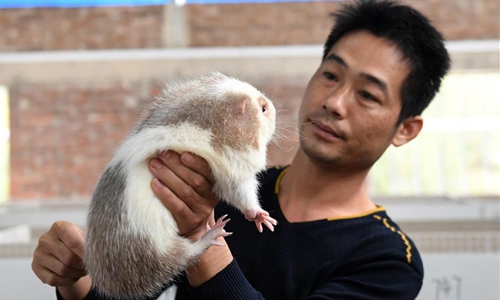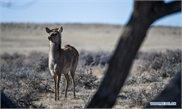SOURCE / INDUSTRIES
China's provinces compensate wildlife farmers to exit sector, start other businesses
Provinces compensate wildlife farmers to exit sector, start other businesses

Photo:Xinhua
Provinces including Central China's Hunan, South China's Guangdong and East China's Jiangxi have released policies by Sunday to compensate farmers who stop breeding wild animals that are now banned from being eaten, as part of a move to maintain environmental safety and protect people's health.
According to a statement on the Hunan government's website on Friday, the first batch of wild animals that should not be bred or consumed includes bamboo rats, cobras and civets. Such wild animals being bred by farmers will be released to nature, used for other purposes like scientific research, buried and burned, according to the statement.
A bamboo rat farmer surnamed Cheng in Qingyuan, Guangdong, told the Global Times on Sunday that he buried hundreds of bamboo rats that he bred in mid-April in response to the local government's call to abandon the wildlife breeding industry.
"As it's said that raising wildlife has health risks, we can't complain when we're asked to stop breeding these animals," Cheng said, noting that wildlife farmers get compensation and low-cost loans if they start other businesses. Cheng now works as a real estate agent.
However, the move won't affect China's poverty alleviation task. Under Hunan's policy, benefits such as discounted loans will be offered to help these farmers transition into other sectors like raising vegetables planting traditional Chinese herbs, and processing wood.
For impoverished households, special small loans will be arranged to promote industrial poverty alleviation.
Dongyuan in Guangdong set aside 2 million yuan ($281,640) in March for subsidies to breeders of banned animals that help them shift into raising other animals or going into other businesses.
There are various types of wildlife breeding farms in China, especially in Guangdong and Guangxi Zhuang Autonomous Region, including both professional farms and local farmers raising small numbers of different kinds of wildlife, such as bamboo rats, masked palm civets, snakes and others.
Sun Wenhua, director of the China Agriculture Chamber of Commerce, told the Global Times on Sunday that local Chinese governments' moves to ban illegal wild animal transactions and encourage domestic wildlife farmers to stop breeding reflects the country's commitment to protect the ecology and people's health.



